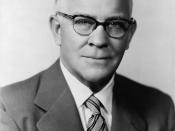It is often stated that society is very judgmental. It can be seen in movies, literary works, or just an everyday walk of life. Arthur Miller chooses to portray society's prejudice against the protagonist, Willy Loman, in his play, Death of a Salesman. Society, in this case, rejects Willy Loman because he isn't upper class, and because he is getting up in age. Many occurrances highlight society's judging of Willy, including him being fired, the 'spite' that he recieves from his sons, and the way he alienates himself. All of these eventually lead to the downfall of a strong, determined, but confused character.
Perhaps the most defeating action that happened to Willy was the loss of his job. All he had ever been in life was a salesman, therefore it was the only trade that he was any good at. When he had the conference with Howard, he had his hopes up.
Willy had regained his confidence in himself and was ready to take control of his life at a very crucial time. However, Howard crushed all of that by firing Willy, simply because he thought Willy, 'needed some rest.' Actually, Howard never intended to give Willy his job back. He was merely trying to take Willy's position because he didn't believe Willy could hack it anymore. This is a reflection of society's present day treatment of the elderly. Younger generations now, move older people into rest homes and try to keep them out of public view, for risk of embarassment. This is reflected by Howard's statement, 'I don't want you to represent us anymore.' Society's assumption of Willy's capabilities, in this case, cost him his job.
A second occurrance that displayed Willy's alienation happened in his own family. Biff doesn't believe whatsoever in his father and has no...


